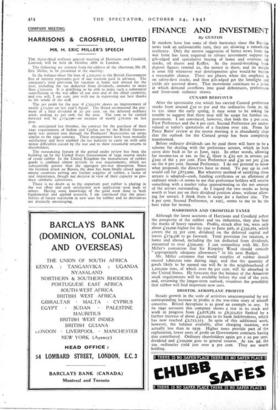FINANCE AND INVESTMENT
By CUSTOS
IF markets have lost some of their buoyancy since the Russian news took an unfavourable turn, they are showing a remarkable resiliency. Only the merest suggestion of better news from the war front has been_required-to release investment support for gilt-edged and speculative buying of home and overseas rail stocks, oil shares and Kaffirs. As the record-breaking bank deposit figures remind us, the money is there, and its weight is soon felt whenever war developments give would-be buyers a reasonable chance. There are phases when the emphasis is on safety-first stocks, and then gilt-edged get the limelight and yields are screwed down. That movement continues to a point at which demand overflows into good debentures, preferences and front-rank ordinary shares.
CUNARD REDIVIVUS
After the spectacular rise which has carried Cunard preference stocks from around Lao to par and the ordinaries from 2S. 6d. to 12s. since the early spring, it may seem to be asking for trouble to suggest that there may still be scope for further im• provement. I am convinced, however, that both the 5 per cent. First Preference and the 6 per cent. Second Preference are under- valued at today's quotations of a fraction over Too. From Sir Percy Bates' review at the recent meeting it is abundantly clear. that the outlook for the Cunard group has been completely transformed.
Before ordinary- dividends can be paid there will have to be a scheme for dealing with the preference arrears, which in both cases date back as far as June, 1931. In other words, allowing for income-tax at los. in the L there is £25 net in arrears per £nio of the 5 per cent. First Preference and £30 net per Don on the 6 per cent. Second Preference. I do not pretend to know what proposals the directors have in mind. To pay up in cash would call for £675,000. But whatever method of satisfying these arrears is adopted—cash, funding certificates or an all0tment of ordinary stock—it seems to me that preference holders will receive something with a market value approximating- to the net amount of the arrears outstanding. As I regard the two stocks as being worth at least par on their dividend position alone, without allow- ing for arrears. I think there is scope for a further' rise. The 6 per cent. Second Preference, at zoof, seems to me to be the best value for money.
HARRISONS AND CROSFIELD TAXES Although the latest accounts of Harrisons and Crosfield reflect the prosperity of the rubber and tea industries, they also bear the marks of heavy taxation. Profits, struck after tax, were only about £to,000 higher for the year to lune 30th, at £350,161, which covers the 25, per cent. dividend on the deferred capital and leaves £174,506 to go forward. Total provision for taxation, at home and abroad, including the tax deducted from dividends, amounted to over £5oo,000. I can sympathise with Mr. Eric Miller's contention that Sir Kingsley Wood should concede " appropriately adequate allowances-" irr his next Budget.
Mr. Miller estimates that world supplies of rubber should exceed 1,600,000 tons during 1941, and that the quantity of goods likely to be turned out will 15e in the neighbourhood of 1,200,000 tons, of which over 6o per cent. will be absorbed in the United States. He forecasts that the balance of the American stock requirements will be available before the end of the year, and, reviewing the longer-term outlook, visualises the possibility that rubber will find important new uses.
BRISTOL AEROPLANE PROFITS Steady growth in the scale of activities unaccompanied by any corresponding increase in Profits is the war-time story of aircraft concerns. Bristol Aeroplane is as good an example as any. In its 1940 accounts this company shows a rise in its stock and work in progress from £4,678,382 to £6,325,621 flanked by a further increase of about £430,000 in its bank indebtedness, which has now reached £2,723,315. In spite of this additional work, howevdr, the balance available, after charging taxation, was actually less than in 1939. Higher taxes provide pan of the explanation, lower rates of profit on Government contracts having also contributed. Ordinary shareholders again get a io per cent. dividend and £too,000 goes to general reserve. At 'cis. 9d. the Dos. ordinaries yield just over 9 per cent. They are worth holding.


























 Previous page
Previous page